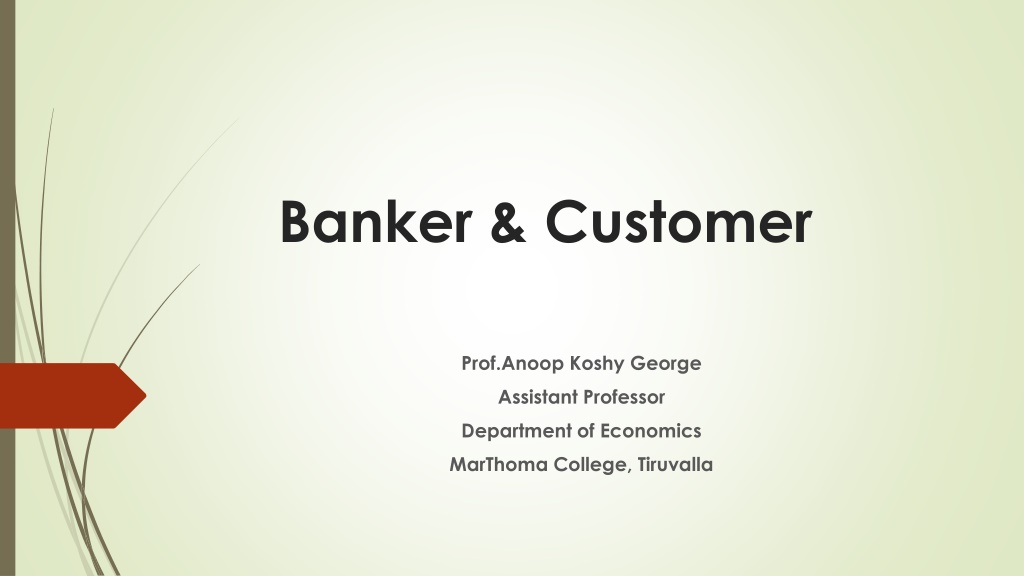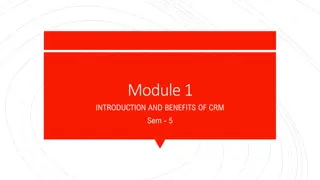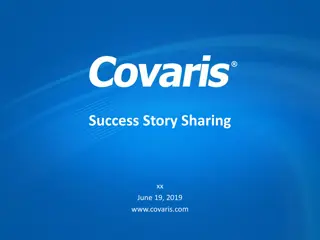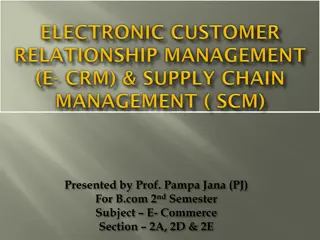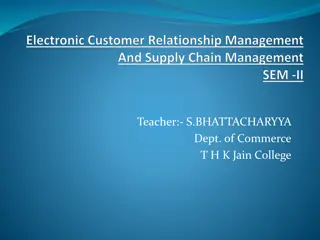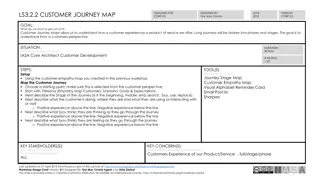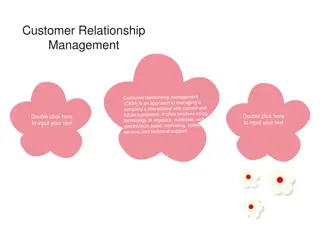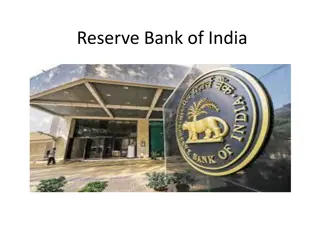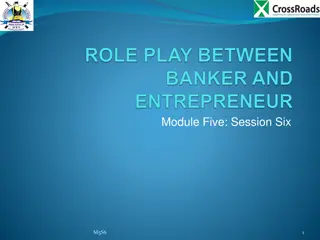Understanding the Relationship Between Banker and Customer
Exploring the dynamics of the relationship between a banker and a customer, including definitions, types of relationships, features, and the roles of debtor/creditor, bailee/bailor, and trustee/beneficiary in the banking context.
Download Presentation

Please find below an Image/Link to download the presentation.
The content on the website is provided AS IS for your information and personal use only. It may not be sold, licensed, or shared on other websites without obtaining consent from the author. Download presentation by click this link. If you encounter any issues during the download, it is possible that the publisher has removed the file from their server.
E N D
Presentation Transcript
Banker & Customer Prof.Anoop Koshy George Assistant Professor Department of Economics MarThoma College, Tiruvalla
Banker Banking : Accepting for the purpose of lending or investment of deposit money from the public, repayable on demand or otherwise and withdrawable by cheque draft order or otherwise Banker : Any person or institution involved in banking business.
Customer A person who has an account in a bank is considered as its customer. A/c Banking transaction Frequency
Relationship between Banker & Customer
deposits loans Bank & Customer Safe deposit locker Collecting cheques payments Banker & Customer Relationship Nature of service provided by a banker
Types of Relationships Debtor & Creditor Creditor & Debtor Bailee & Bailor Lessor & Lessee Agent & Principal
Debtor & Creditor Banker Customer Debtor Creditor
Creditor & Debtor Banker Customer Creditor Debtor
Features Creditor must demand payment Security of debt Right to give directions Closure of account
Bailee and Bailor Bailment is the delivery of goods or movable property by one person to another for some purpose, upon a contract that they shall, when the purpose is full filled, be returned or disposed according to the directions of the person delivering them. The person delivering the goods is called bailor The person to whom these are delivered is called the bailee. Banker Customer Bailee Bailor
Trustee and Beneficiary Trust means the obligation of a person or a firm to look after or preserve the properties of another person. Banker Customer Trustee Beneficiary
Agent & Principal Banker Customer Agent Principal
Lessor and Lessee Owner of an asset who lends it for use to another one for a periodic payment is called lessor The one who takes the asset for use and making periodical payment to the owner of the asset is called lessee. Banker Customer Lessor Lessee
Special Relationships Obligation of a banker Obligation to honour cheque Obligation to maintain secrecy Obligation to maintain proper records of the customer
Bankers right of general lien Lien is the right of a person to retain the property in his possession, belonging to another until the debt due from the owner of that property is repaid. General lien Special lien
Particular lien / Special Lien Right of the CREDITOR to retain the particular property until the particular debt is repaid. Eg.Tailor
General lien Right of a creditor to retain any property belonging to debtor until all the debts are repaid. Lien on customers fund Lien on documents of title of goods Lien on FD receipt Lien on Life insurance policy Lien on cheque, promissory note etc.
Bank cannot exercise the right of lien Safe deposit locker Documents deposited for specific purposes Securities held in trust
Rights cont.. Bankers right to set off or combine accounts Bankers obligation and right regarding appropriation of payment. BANKERS RIGHT NOT TO PRODUCE ORGINAL BOOKS OF ACCOUNT UNDER BANKERS BOOK EVIDENCE ACT 1981 Bankers right to charge compound interest. Bankers right to charge incidental charges charges for keeping the account
Banker and Garnishee order Order issued by the court of law and served to the banker, directing not to honour the cheque of a customer, who happened to be a debtor judgement. Order Nissi provision regarding the amount to be attached. Order absolute directing the banker to transfer the credit balance of the debtor judgement to the credit of the creditor judgement.
Types of bank account CA SB FD RD CD
Current Deposit or Running Account Money can be deposited and withdrawn with out any limitations Unlimited transactions OD Collection of cheques No interest. Ledger folio charges
Savings Account To encourage saving habits Restriction on withdrawals Cheque book Internet banking Zero balance
Fixed Deposit Repayable after the expiry of a fixed period. Loan facility 7days to 10 years. Repayment of amount before maturity is allowable.
Recurring Deposit Depositors save and deposit regularly every month a fixed instalment so that they are assured of the sizeable amount at a later period. Starting from Rs.50 6-120 months Periodic payments Maturity amount will be paid after the maturity period
Certificate of Deposit Deposit from corporate entities Minimum is Rs.100000/- Issued at discount 7 to 365 days
NRI Accounts Non residents can deposit the foreign money Converted to rupees at prevailing interest rates.
Cheque A cheque is a bill of exchange drawn on a specified banker and not expressed to be payable otherwise than on demand and its includes the electronic image of truncated cheque and cheque in the electronic form Unconditional order,drawn on a specified banker and is always payable on demand.
Features Must be in writing Unconditional order Drawn on a bank Signed by the drawer Payment for a fixed sum of money Payee must be certain Payable on demand
Parties Drawer : party who draws the cheque Drawee : always be the bank where the drawer has bank a/c. Payee : the person to whom the amount of the cheque is made payable
Kinds of Cheques Bearer Cheque : cheque which can be encashed by the bearer. Order cheque : cheque contains the name of payee Blank cheque : cheque on which drawer puts his signature and leaves all other columns blank. Anti dated cheque : cheque which bears a date earlier than the date of issue. Post dated cheque : cheque which bears a date later than the date of issue. Stale cheque : cheque which is not presented for payment within three months from the date of issue of cheque. Mutilated cheque: cheque which is torn into two or more pieces. Marked cheque : marked good for payment
Dishonour of cheque As per Sec.31 of Indian Negotiable instrument act 1881. Sufficient credit balance must be available. Cheque must be drawn in proper form and its complete in order. Cheque should be presented for payment within a reasonable time. No legal bar preventing the payment of cheque. Amount of the cheque. Drawers signature
Crossing of cheque Crossing is an instruction given to the paying banker to pay the amount of the cheque through an account only and not directly to the person presenting it at the counter of the paying banker. Drawing two parallel transverse lines across the face of the cheque with or with out the word &co or with the name of collecting banker between the lines.
General crossing Drawing two parallel lines on the face of the cheque constitutes general crossing. The cheque bears an abbreviation &Co Not negotiable a/c payee The effect of general crossing is that the cheque must be presented to the paying banker through any bank where the payee has bank account.
Special Crossing Drawing of two parallel lines on the face of the cheque and inserting the name of the collecting between the two parallel transverse lines is known as special crossing.
Opening of crossing If the crossing of the cheque is cancelled, its called opening of the cheque. Drawer pay cash and cancel the crossing by putting signature of the drawer.
Endorsement En = upon + dorsum = the back Act of signing on the back or on the face of a negotiable instrument or on a slip of paper attached to it for the purpose of negotiation. Endorser : The person who endorses the negotiable instrument Endorsee : the person to whom it is endorsed.
Kinds of endorsement Blank Endorsement or General or bearer Endorsement Endorser merely signing on the back of the instrument without mentioning the name of the person to whom the instrument is endorsed. Full Endorsement or Special Endorser sign on the back of the instrument by writing the name of the person to whom it is endorsed. Restrictive Endorsement Endorser signing on the back of the instrument by restricting the further negotiation of the instrument. Pay Mr.X or Order (Sd) Mr.y Pay Mr.X only (Sd) Mr.y
Conditional Endorsement : endorser signing on the back and he makes liability on the instrument and right of the endorsee to receive the payment of the instrument depends on happening of a specified event. Facultative Endorsement : the endorser signing on the back of the instrument after writing the name of the endorsee and waives or surrender his right to receive the notice of dishonour by adding words notice of dishonour waived . San recourse endorsement : type of endorsement in which endorser frees himself from any liability related to the endorsement. Pay Mr.X or Order on the arrival of mr.w at cochin port by 07 November 2011 (Sd) Mr.y Pay Mr.X or Order Sans recourse (Sd) Mr.y Pay Mr.X or Order Notice of Dishonour waived (Sd) Mr.y
